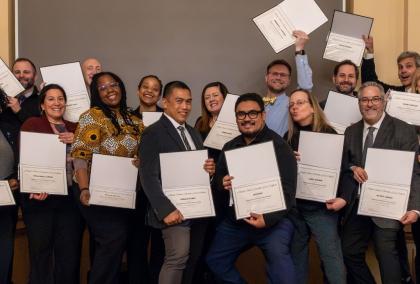David Dorman is an experienced toxicologist whose arrival in Kuopio as a Fulbright-Saastamoinen grantee was a strike of luck for toxicology courses at the School of Pharmacy and at the Department of Environmental and Biological Sciences. Due to the coronavirus pandemic, the joy was short-lived, but collaboration will continue online.
Chemical risk assessment is one of the areas where toxicology expertise is needed. David Dorman is Professor of Toxicology at North Carolina State University, and in his research he has focused, among other things, on the effects of different chemical exposures on brain development as well as the role of the olfactory system in transporting chemicals to the brain. One branch of research involves dog olfaction: Dorman’s research group has studied how dogs learn to detect explosives as well as cancer by scent.
Fulbright-Saastamoinen Foundation Grants in Health and Environmental Sciences enable leading American scholars to teach and conduct research at the University of Eastern Finland for a period of six months. Dorman started his grantee period on the Kuopio Campus in January, with Kuopio being his preference because of the international Master’s Degree Programme in General Toxicology, which is unique in Finland. His expertise was also welcomed by the Master’s Degree Programme in Environmental Health and Technology, which shares a number of topics and courses with the toxicology programme.
“David’s suggestion of collaboration was the best thing that could have happened. Due to retirements, we are short of toxicology teachers and researchers. And, of course, new international contacts are always valuable,” Professor Emeritus Matti Viluksela says.
There’s a lot of interest in systematic review – counselling continues online
In Kuopio, Dorman got a quick start in teaching on several courses, including a new course on systematic review in chemical risk assessment. “For a visiting professor, it’s an ideal situation to really be of use and to be able to make an impact. There are a lot of students whose thesis work is based on literature reviews, so I was able to give feedback on many projects. Luckily, I can keep on counselling some students online,” says Dorman, who had to interrupt his visit in March due to the COVID-19 pandemic.
In a systematic literature review, answers to research questions are sought by conducting a methodical review of earlier research on the topic. According to Dorman, the methodology of systematic reviews in toxicology has seen considerable developments in the past decade.
“In medicine, systematic reviews provide the highest level of evidence for treatment efficacy. At present, a very topical issue is the treatment of COVID-19 patients, and one of the drugs being tested in several studies is the anti-malaria drug chloroquine. In due course, a systematic review of the literature will help to assess its usefulness.”
Dorman is an awarded teacher, and he got positive feedback for his student-activating teaching in Kuopio as well. “Compared to American students, Finns turned out to be rather quiet and reserved, but they did warm up to discussion eventually,” he notes.
According to Senior Researcher Kati Huttunen, Dorman gave a valuable input in several courses, including the newly updated course on chemicals, the environment and health. “We will definitely make use of his course materials and recordings in the future, even if he can’t be physically here to teach. Personally, his lectures gave me some really good pointers on how to engage students in class.”
As his visit was interrupted, Dorman had no time to lecture on dog olfaction as planned, nor to acquaint himself with the cancer dog research carried out at the University of Eastern Finland. He hopes to be able to convert the missed grantee period to several shorter visits within the next few years.
“One thing our research on dogs has shown is that when training dogs to identify, say, a cancer-positive sample, it’s important for the test administrator to be blinded as well, to avoid giving even the smallest unintentional cues to the dog. Another observation is it’s quite a challenge to train dogs to generalise – to not just pick up a certain scent but to alert for it in a given context, like in explosives but not in fertilizers.”
David Dorman’s spouse, Melanie Foster, is also a toxicologist, and she came to Kuopio with him as a visiting researcher. During their visit, Dorman kept a blog highlighting their experiences of the everyday and academic life in Finland, as well as of their visits to destinations nearby.
“Saastamoinen Foundation and Fulbright Finland Foundation are important players in promoting international collaboration. It’s a trying time for them as well, with so many long-planned grantee periods interrupted or postponed,” Dorman notes.
Text: Ulla Kaltiala
The article was originally published at University of Eastern Finland website


